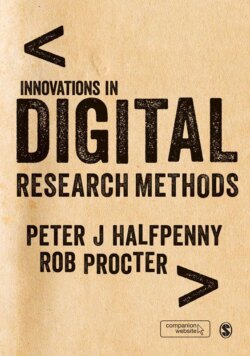Читать книгу Innovations in Digital Research Methods - Группа авторов - Страница 18
На сайте Литреса книга снята с продажи.
Chapter 3: Exploiting New Sources of Data
ОглавлениеIn this chapter, Elliot and Purdam take up the methodological challenges, outlined in Chapter 2, that researchers face if they are to make effective use of new sources of digital social data. They employ a series of case studies of research, including election campaigns, civil unrest, migration and mobility, and health and well-being, to illustrate how methodological innovations, such as crowd-sourcing, may be mobilized to meet the challenges.
Opinions on the value of new forms of social data have divided academic social researchers, with some taking the view that the discipline is on the threshold of a renaissance, including opportunities to study the social world in real time. Others dismiss such claims as naïve at best and – at worst – sacrificing methodological robustness and validity for convenience. Regarding the latter, numerous critics have raised concerns that the sheer volume of new forms of social data will make computational methods increasingly attractive to researchers and lead them to ignore the risks of relying on computer power to drive their analyses. One such risk is that posed to the verification and repeatability of results, which arises from using complex, and sometimes proprietary, algorithms that lack transparency; for example, the operationalization of statistical formulae in the packages researchers use are hidden from them. Another risk is that posed to meaningful understanding of social phenomena by the lure of spurious correlations thrown up by over-reliance on inductive methods.
Mindful of these problems, Elliot and Purdam argue that the solution is a middle course, combining new and conventional sources of data in a robust, mixed methods approach that bridges data- and hypothesis-driven traditions. There are, of course, obstacles to be overcome. New sources of data such as social media may increase threats to privacy, and Purdam and Elliot call for more research into ways of countering these threats through improved methods for data anonymization and a new ethical framework. In relation to the latter, they note that it is time that citizens realized the value (economic and social) of their own data and, equally importantly, they argue that commercial interests must not be allowed to constrain researchers’ access to new forms of social data.
